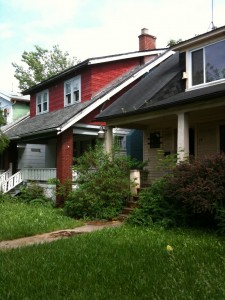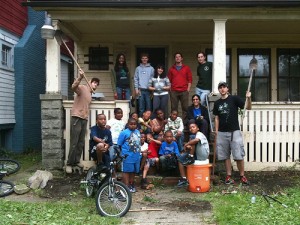A city that once pioneered a new economy for a new America is now passing on its legacy to 21st century entrepreneurs sculpting it’s rebirth from the ashes. The spirit is still here, it actually never left. Hiding in the halls of historic automotive buildings and creeping into a declining, but indigenous, market place. Highland Park has changed the world before, and this summer Highland Park will carry the torch once again. (more…)
This post was originally sent to members on our News and Action list. Be the first to take action with Global Exchange and sign up for our e-mail lists.
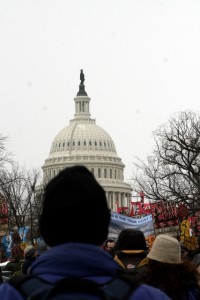 The first few weeks of 2011 have been a time of transitions. Aside from transitioning to a new year and a new decade, we have seen a transition of power in the US Congress. The new Republican majority in the House threatens to impede real progress with their refusal to cut defense spending, a push to repeal healthcare, and a call to shut down the Environmental Protection Agency.
The first few weeks of 2011 have been a time of transitions. Aside from transitioning to a new year and a new decade, we have seen a transition of power in the US Congress. The new Republican majority in the House threatens to impede real progress with their refusal to cut defense spending, a push to repeal healthcare, and a call to shut down the Environmental Protection Agency.
Global Exchange is prepared to stand with you in opposition to these regressive moves. We will fight to stop rollbacks of progressive policies and continue to push for positive change in our communities at home and abroad. Through grassroots activism we will prevail.
Here are just a few campaigns we have in store for 2011:
- Transition from corporate interests to humanitarian justice: Corporate interests are among the
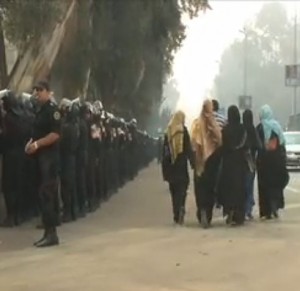 strongest forces fueling the Israeli Occupation of Palestine. Come February, Global Exchange will host courageous feminist peace activist Dalit Baum. Dalit is currently working in Israel on a project called Who Profits?, an online database that exposes companies and corporations profiting from the Israeli occupation. She will bring her extensive knowledge of grassroots activism to North America, teaching Who Profits’ research methods to the peace movement to infuse their work with new perspective and hard-earned wisdom. The long-term goal is to help change public opinion and corporate policies, moving towards an end to the occupation and a lasting peace in Israel/Palestine.
strongest forces fueling the Israeli Occupation of Palestine. Come February, Global Exchange will host courageous feminist peace activist Dalit Baum. Dalit is currently working in Israel on a project called Who Profits?, an online database that exposes companies and corporations profiting from the Israeli occupation. She will bring her extensive knowledge of grassroots activism to North America, teaching Who Profits’ research methods to the peace movement to infuse their work with new perspective and hard-earned wisdom. The long-term goal is to help change public opinion and corporate policies, moving towards an end to the occupation and a lasting peace in Israel/Palestine. - Transition from dirty energy to clean energy: The BP oil spill in the Gulf of Mexico was
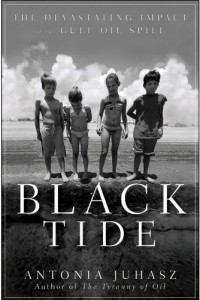 the largest oil spill in American history, and oil from the spill continues to impact lives and livelihoods throughout the Gulf. Through this tragedy we have been reminded of the negative consequences of our dependence on dirty energy and our need to support clean alternatives for people and the planet. One year after the devastating Deepwater Horizon explosion, Global Exchange’s Energy Program Director, Antonia Juhasz, will release her book Black Tide, a “searing look at the human face of BP’s disaster in the Gulf and exposes the human failings and the human cost of man-made disaster that will be with us for a very long time.”
the largest oil spill in American history, and oil from the spill continues to impact lives and livelihoods throughout the Gulf. Through this tragedy we have been reminded of the negative consequences of our dependence on dirty energy and our need to support clean alternatives for people and the planet. One year after the devastating Deepwater Horizon explosion, Global Exchange’s Energy Program Director, Antonia Juhasz, will release her book Black Tide, a “searing look at the human face of BP’s disaster in the Gulf and exposes the human failings and the human cost of man-made disaster that will be with us for a very long time.” - Transition from free trade to Fair Trade: Despite almost ten years of commitments from Hershey’s to take responsibility for their cocoa supply chains and improve conditions for workers, significant problems persist. Hershey’s lags behind its competitors when it comes to taking responsibility for the communities from which it sources cocoa, so we’re calling on them to “Raise the Bar” and go Fair Trade. This year, we’re working on several ways to get the word out about Fair Trade through various campaigns such as Sweet Smarts, National Valentine’s Day of Action, Reverse Trick-or-Treating, and more.
- Transition from climate change to system change: After the Climate Talks in Cancun this past December, it was clear that Western leaders favored corporate-driven solutions for climate
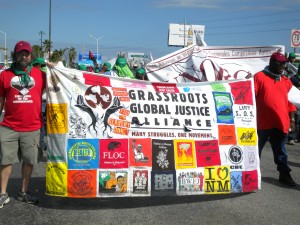 change over community-based solutions. Although the climate agreement that came out of Cancun ignored thecommunities directly affected by climate change and the rights of nature, Global Exchange continues to advocate for climate justice in the upcoming The Rights of Nature: The Case for a Universal Declaration on the Rights of Mother Nature. The book, set to be released in April, will reveal a movement driving the cultural and legal shift that is necessary to transform our human relationship with nature away from being property-based and toward a rights-based model of balance that no longer views nature as property to be destroyed at will.
change over community-based solutions. Although the climate agreement that came out of Cancun ignored thecommunities directly affected by climate change and the rights of nature, Global Exchange continues to advocate for climate justice in the upcoming The Rights of Nature: The Case for a Universal Declaration on the Rights of Mother Nature. The book, set to be released in April, will reveal a movement driving the cultural and legal shift that is necessary to transform our human relationship with nature away from being property-based and toward a rights-based model of balance that no longer views nature as property to be destroyed at will. - Transition from a greed economy to a green economy: Casino capitalism is wreaking havoc on the
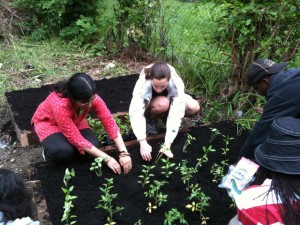 planet, but there is an alternative. It’s called local green economies – urban agriculture, locally controlled clean power, and sustainable industry — and we’re building them in Michigan, California and across the country. We’re also traveling from city to city sharing a message of a greener future at the Global Exchange co-sponsored Green Festivals – the biggest and best sustainability event in the country. Celebrating its 10th year, Green Festival will be expanding to the two biggest cities in the US — New York and Los Angeles.
planet, but there is an alternative. It’s called local green economies – urban agriculture, locally controlled clean power, and sustainable industry — and we’re building them in Michigan, California and across the country. We’re also traveling from city to city sharing a message of a greener future at the Global Exchange co-sponsored Green Festivals – the biggest and best sustainability event in the country. Celebrating its 10th year, Green Festival will be expanding to the two biggest cities in the US — New York and Los Angeles.
You make this work possible. Thank you to everyone who gave a gift last year. We still need your support in 2011. None of our work is possible without the financial support of our members. Help us make the necessary, positive transition. Donate today!
Despite the new Republican leadership in the House, the grassroots movement has a great and important opportunity to be leaders in the fight for peace and social justice. We hope that you will join Global Exchange in 2011 to resist injustice, envision alternatives and take action.
(This summer, our Michigan team is working with GreenNation on the Green Economy Leadership Training program. This entry was written by GELT-er Ayoola White. Cross-posted on Solutionaries.net)
Window kits? Check.
Toolbox? Sink aerators? Clipboard? Check, check, check.
Every morning, for the week and a half that the GELT team performed weatherizations, we hustled to prepare for the day. We gathered our supplies, called Highland Park residents, and hurried off to our destinations. People generally tend to regard all neglected communities as if they were identical, but we quickly recognized that no two houses were alike, neither in their weatherization needs nor in their family dynamics.
At every household, we were offered a little peek into the stories of those who lived there. Many of the narratives were nonverbal, implied in sighs, creaky stairs, and the giggles of children running around. Karina, an outspoken woman who has resided in the area for a long time, actually took the time to verbalize her story to my partner and me.
What surprised me so much about Karina was how freely she spoke about events in her personal life, especially to two young strangers. She had no qualms whatsoever about conveying her feelings about her ex-husbands, her ailing mother, her battle with drug addiction, or her complaints about certain neighbors. Her narrative was more than a little shocking, but, in the end, she gave a simple, yet moving account of how she took a step toward ridding herself of her pain.
Until recently, Karina never felt comfortable in her own home. To her, the walls held memories of toxic relationships and bitter shouting matches. In her studies as a student of natural healing, she eventually realized that she had to change her surroundings if she was to take control of her life. So she painted her walls a whimsical shade of pink.
Karina’s fundamental lesson for us was the importance of honoring oneself. People without self-respect and self-love are like black holes that swallow everything, even light. They make destructive decisions and can never truly move forward.
Listening to Karina’s story has made me realize that we cannot forget that there are individuals in the environmental movement. Coalition building and community organizing are vital, of course, but we cannot simply regard ourselves as identical cogs in a machine. We must learn our strengths, hone them, and adapt them.
For the last few months, our Michigan team has been working with the local community in Detroit to transition it to a clean, green economy starting with Highland Park. The Green Economy Leadership Training (GELT) integrates education and community while applying empowering solutions derived from these community classrooms. GELT seeks to train and empower generations of people to collectively build, work and live in the green economy.
Well, we’ve been keeping you updated on the GELT teams’ progress all summer and last night, CNN’s Joe Johns of Anderson Cooper 360 caught up with the project in Detroit in his segment “One simple thing: A green makeover for Detroit.”
Way to go Scott, Brandon and the rest of the GELT team in Highland Park as they work together to try to turn Detroit into a model city.
To find out more about the Green Economy Leadership Training program, you can visit their page where you can read stories, see photos and even contribute to the efforts in Detroit. Also, be sure to read the stories from the GELTers themselves. Inspiring stuff. A green economy future is possible.
(This summer, our Michigan team is working with GreenNation on the Green Economy Leadership Training program. This entry was written by GELT-er Ayoola White. Cross-posted on Solutionaries.net)
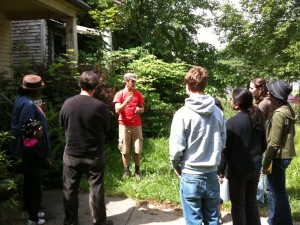 Over the course of our time in Highland Park, we GELT-ers have had a variety of learning experiences: permaculture lessons, visits to nearby farms, a lecture about the danger of nuclear power, and tutorials on home weatherizations. In addition to those classes, we’ve been taking a seminar entitled “the Freedom Movement”. In this seminar, we have discussed the history of slavery, the Montgomery Bus Boycott, and the Poor People’s campaign.
Over the course of our time in Highland Park, we GELT-ers have had a variety of learning experiences: permaculture lessons, visits to nearby farms, a lecture about the danger of nuclear power, and tutorials on home weatherizations. In addition to those classes, we’ve been taking a seminar entitled “the Freedom Movement”. In this seminar, we have discussed the history of slavery, the Montgomery Bus Boycott, and the Poor People’s campaign.
To the untrained eye, this seminar would stick out like a sore thumb when compared with everything else. After all, our overarching goal is to create a model green economy in Highland Park. What do the civil rights battles of the past have to do with the environmental struggles of today?
In actuality, social and environmental concerns have salient intersections. After all, the most disadvantaged people in the world—women, people of color, citizens of the Global South, and disabled people—will be affected first and most severely by climate change, pollution, rising ocean levels, and the like. These groups have struggled and continue to endeavor to gain political efficacy, just as blacks, women, Chicanos, and indigenous peoples did in the ‘50s and ‘60s in the United States. Attempts to solve environmental problems must take into account human communities in order to succeed. Sadly, not everyone realizes this necessity. As one workshop facilitator at the United States Social Forum noted, news regarding environmentalism covers two topics almost exclusively: politics and polar bears. People? Not so much. How can the human population as a whole deal with environmental crises if a substantial portion is so encumbered by pernicious, institutionalized forms of negligence and discrimination? The lessons from the Freedom Movement offer tools to ameliorate the situation.
In our Freedom Movement class, we’ve sharpened the valuable skill of defending our ideas. One exercise we’ve 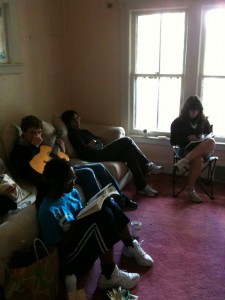 practiced is to create a short thesis—25 words or fewer. Then, we must defend that thesis for ten minutes against probing and difficult questions from our peers. With this exercise, we have to keep cool and think on our feet, much like the countless civil rights activists who made arguments for equality to people who vehemently—and sometimes violently—resisted the encroachment on their unearned privileges. Certainly, the stakes aren’t the same, but I personally appreciated this opportunity, since persuading irreconcilables to recognize the reality and urgency of climate crisis is such a burdensome yet necessary task.
practiced is to create a short thesis—25 words or fewer. Then, we must defend that thesis for ten minutes against probing and difficult questions from our peers. With this exercise, we have to keep cool and think on our feet, much like the countless civil rights activists who made arguments for equality to people who vehemently—and sometimes violently—resisted the encroachment on their unearned privileges. Certainly, the stakes aren’t the same, but I personally appreciated this opportunity, since persuading irreconcilables to recognize the reality and urgency of climate crisis is such a burdensome yet necessary task.
Nonviolence is another key concept we’ve explored. Although environmental activism is not typically considered to be as aggressive as other forms of activism (hey, we’re treehuggers, not tree mercenaries, right?) it is vital to remember that, as Martin Luther King, Jr. observed, “Hate multiplies hate, violence multiplies violence, and toughness multiplies toughness in a descending spiral of destruction.” We, as environmentalists, must be proactive, not reactive. Moreover, we must make connections to other movements, not simply notice parallels between them.
(This summer, our Michigan team is working with GreenNation on the Green Economy Leadership Training program. This entry was written by GELT-er Zack Holden. Cross-posted on Solutionaries.net)
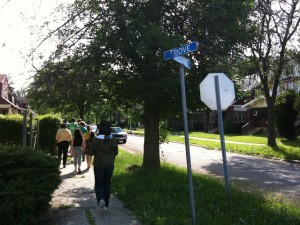 As we came to the door, I was feeling pretty negative. Tired, frustrated with the cancellation of our early morning appointment, I had bitterly informed my partners that they should take the ‘lead’ on this house, that I just wanted to follow orders and let one of them take up the task of explaining who we were and everything we were doing to the home owner. I had a vague sense of ill ease as we reached our destination on Hill Street in the northwest of Highland Park, as the last time we had lugged a weatherization kit through the neighborhood, we had been told we were ‘in the wrong neighborhood’ by a group of teens.
As we came to the door, I was feeling pretty negative. Tired, frustrated with the cancellation of our early morning appointment, I had bitterly informed my partners that they should take the ‘lead’ on this house, that I just wanted to follow orders and let one of them take up the task of explaining who we were and everything we were doing to the home owner. I had a vague sense of ill ease as we reached our destination on Hill Street in the northwest of Highland Park, as the last time we had lugged a weatherization kit through the neighborhood, we had been told we were ‘in the wrong neighborhood’ by a group of teens.
When we came up the front steps and knocked on the door, I noticed the tape holding together the screen door and the lingering smell of stale tobacco, thinking we were in for a interesting experience. We heard a man hollering at us, asking who we were. A woman soon came to the door, asking who we were and who we were looking for, telling us she didn’t want our ‘shit’, Needless to say, we were taken aback by her rather aggressive manner, and the weatherization was nearly dead on arrival, until the man, her husband, informed her that he had in fact signed up. She was further relieved when (in direct contravention of my previous promise to my partners) I explained to her that our service was in fact free, and that we would not only give her the supplies but actually install them as well. When she realized we weren’t trying to scam her or otherwise pull some trick, her demeanor instantly shifted from stand-offish to absolutely friendly, and a smile came over her face.
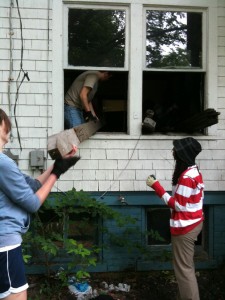 As we headed into the basement, her husband offered a brief explanation of her initial resistance to us- there had been a ‘death’ recently, and tensions were running high. I didn’t have to wait long to hear the full story. As I burned my fingers trying to install CFLs, she told me that the death in question was in fact a triple murder that had recently occurred on the block, leaving three young men dead, with no news coverage and little hope of justice. She explained her initial hostility, saying there was a huge drug problem on the block.
As we headed into the basement, her husband offered a brief explanation of her initial resistance to us- there had been a ‘death’ recently, and tensions were running high. I didn’t have to wait long to hear the full story. As I burned my fingers trying to install CFLs, she told me that the death in question was in fact a triple murder that had recently occurred on the block, leaving three young men dead, with no news coverage and little hope of justice. She explained her initial hostility, saying there was a huge drug problem on the block.
These were the first revelations of many. As we worked our way through her home, sealing holes, replacing bulbs and sink heads and putting up weatherstripping, we learned that she had reclaimed the home from drug dealers who had taken over the house after her mother’s death, and how strangers still showed up at her door looking for a fix (she thought we were of this category), how drive by shootings were a regular occurrence (instead of putting plastic kits over windows with leaky edges as we might in other homes, we covered the windows taken out by a recent shooting). How murders were common and a 90 year old woman had been raped on the block just the other week. How she wanted to get out of the neighborhood, but she was living on her unemployment checks after losing her job as a medical assistant.
This is the sort of situation that can present the central problem of organizing around environmental and sustainability issues in places like Highland Park. How could she devote attention to protecting our national parks or atmosphere when protecting her home is a matter of life or death? I honestly believe that the solution lies in programs such as Green Economy Leadership Training (GELT) and weatherization in particular. It allows for community and its residents to work together not only to save money on their utility bill and understand environmental impacts, but to also reconnect with one another. Weatherization makes both environmental and economic sense. I hope it can present an outstanding site to develop the necessary, mutually beneficial relationships in places such as Highland Park.
(This summer, our Michigan team is working with GreenNation on the Green Economy Leadership Training program. This entry was written by GELT-er Zack Holden. Cross-posted on Solutionaries.net)
 This past Thursday, I learned to soder, or to speak very technically, sweat pipes. Later that day, we built a bench out of discarded wood combined with the trunk of a tree I had cut down earlier in the day. This doesn’t sound too meaningful, but in actually it pretty profoundly represents the genius of GELT, and why I decided to spend my summer in Highland Park.
This past Thursday, I learned to soder, or to speak very technically, sweat pipes. Later that day, we built a bench out of discarded wood combined with the trunk of a tree I had cut down earlier in the day. This doesn’t sound too meaningful, but in actually it pretty profoundly represents the genius of GELT, and why I decided to spend my summer in Highland Park.
You see, sodering and making a bench share the attribute of being work that engages with ‘the good’. Sorry for lapsing into jargon, but what I mean is that this type of labor engages with the human need for excellence. Further, in this type of labor, you know if you reached the ‘Good’- the bench either holds weight and stands straight, or it doesn’t. The pipes either hold water, or they don’t. To me at least, this presents a welcome relief from the abstract realm of academia.
My love for this type of work isn’t just born out frustration with intellectual debates, I also find that his kind of work offers a certain satisfaction in that it actually produces. At the end of the day, I have a pipe system and a bench to show for my labor, and the knowledge that I have produced something useful in this world.
This production is the driving force behind GELT. I find that the supreme virtue of GELT in comparison to my previous experiences in the sustainability movement is that GELT has a unique focus on producing a tangibly greener world. Instead of producing memos, GELT produces raised beds, hoop houses, and cob ovens. This is why I chose to spend my summer in Highland Park- it allows me to put my beliefs into practical action, and physically create the green world I want to live in.
(Global Exchange’s Michigan team is working with the local community in Detroit to transition it to a clean, green economy starting with Highland Park. One of our Michigan organizers, Scott Meloeny introduces the Green Economy Leadership Training (GELT) summer program.)
[Cross-posted from It’s Getting Hot in Here.]
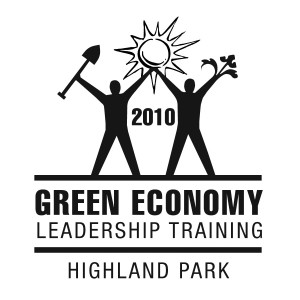 This country has been built and influenced by each generation that has come to pass. While we still face major social issues, these previous generations have contributed some of the most impressive feats known to man, developing unique and marketable skills and tools that have fueled an extraordinary amount of growth and set the highest standard of living the world has ever seen. However, our generational brethren also left behind something else: a very specific mind set on the world. A mind set that can be seen today powering our infrastructure, shaping our culture, and instilling our values. One that was relative to the times of our mothers and fathers, grandparents and great-grandparents but now stands outdated and dangerous.
This country has been built and influenced by each generation that has come to pass. While we still face major social issues, these previous generations have contributed some of the most impressive feats known to man, developing unique and marketable skills and tools that have fueled an extraordinary amount of growth and set the highest standard of living the world has ever seen. However, our generational brethren also left behind something else: a very specific mind set on the world. A mind set that can be seen today powering our infrastructure, shaping our culture, and instilling our values. One that was relative to the times of our mothers and fathers, grandparents and great-grandparents but now stands outdated and dangerous.
Bob Dylan was right when he said “the times, they are a changin’.” In fact, times have changed. One doesn’t need to look very far to see that our previous generation’s systems, values and ideas were built to be supplied by a finite source that right now is exhausting our planet’s resources, while destroying its species and environment. It is here we can witness most explicitly our generational divide. One in which past generation’s values, skills and mind sets are no longer suitable or sustainable for us. We need to embrace this divide. But we must do so carefully and in a way that equips our peers with new skills, values and perceptions, and also enables older friends, families and neighbors to partake and share in building a new holistic, clean energy economy. It’s time to have exponential learning overcome exponential growth. It’s time to value accumulated wisdom overcome accumulated wealth.
BUILDING A BRIDGE TO SOMEWHERE
To bridge this multi-generational divide we need to integrate education and training, applying both to communities and peoples who need it the most. Unfortunately, past generations relied on a model where the privileged would go off to higher learning, while others were left behind in communities ill-equipped to make necessary, sustainable changes for growth. As we have seen recently with our older college grads, the path of post high school education does very little to prepare one for the skills needed to mend social, economic and cultural inequalities. This is where we believe the first steps can be taken. The skills and knowledge that go beyond the classroom and make tangible impacts in the community is what we at Global Exchange see as a potential equalizer for such existing inequalities.
The Green Economy Leadership Training (GELT) is the first program from GX to begin to integrate education and community while applying empowering solutions derived from these community classrooms. GELT provides present day skills, knowledge and experience that present and future generations will need to not only assist in building a new energy economy, but also to live in a way that creates a healthy and positive synergy within our world. With technical skills in renewable energies, energy efficiency, permaculture and community development combined with personal skills in chi-wellness, yoga, nutritional health and lifestyle consciousness, GELT seeks to train and empower generations of people to collectively build, work and live in the clean energy economy.
THE HIGHLAND PARK PROJECT
The Green Economy Leadership Training, a Global Exchange and GreeNation program, calls Highland Park (HP), Michigan headquarters. Once a model city for all to follow, HP no longer finds its current infrastructure and skills suitable for a clean economy transition. However, HP has the unique opportunity to restructure its system, re-skill its workforce and reactivate its pioneering attitude that once led a nation decades ago and become one of the first clean economies of its kind.
Although only its first year, GELT will look to achieve some watershed moments by the end of summer. Already, ten individuals have received their certification in permaculture. Even more are being trained on how to weatherize homes and will then go out and perform up to 200 weatherizations throughout the city. This is especially important, as up to 40% of Highland Park residents live under the poverty level, making it very difficult for many to adequately heat their homes. Proper weatherizations will provide a 10-15% decrease in monthly bills, giving some financial relief to local residents but more importantly providing them a safe, warm home during Michigan’s long winters. In addition to training, classes in demand-side economics for renewable energy and energy efficiency will give participants the understanding of what it takes to transition to a clean energy economy at both the local and national level.
2010 Summer GELT Course Catalog
GELT is also building for the long term to create a model clean energy economy and it all begins at the micro level. It’s here GELT is seeking to create a foundation for a city wide food system that will provide nutritional food year round to all its residents as well as install a farmers market that will be available in the fall of 2011. This will be done by redeveloping vacant lots throughout the city and connecting them into block based cooperatives that give ownership to residents. However, achieving food security for local residents will not be our only goal. GELT will also look to implement a micro-grid utility over the next three years. This entity will provide energy to residents in a variety of ways. First, by converting two homes into utilities that provide electricity and hot water (solar photovoltaic and solar hot water) through renewable sources, as well as heating and cooling (geo-thermal). Residents will then have the opportunity to reap the benefits of renewable energy and ownership of their power production. These localizes systems will look to employ community residents so that we may come full circle in providing a community based model of the clean energy economy.
The Green Economy Leadership Training will be a flagship program of Global Exchange, as we will continue to run more programs throughout the fall and winter and into the new year until we can make our vision a reality; a community model of a holistic, clean energy economy. It’s always been said that a narrow mind set is an obstacles to change, but we hope through our community actions to overcome even this profound psychological barrier. GELT seeks to be one of many actions that will bring about tangible solutions for creating a model clean energy economy in Highland Park, Michigan. Because as today’s generational shift continues, we must fully embrace the responsibility to continue healthy evolutions in this country as well as doing what we can to reverse problematic ones.

